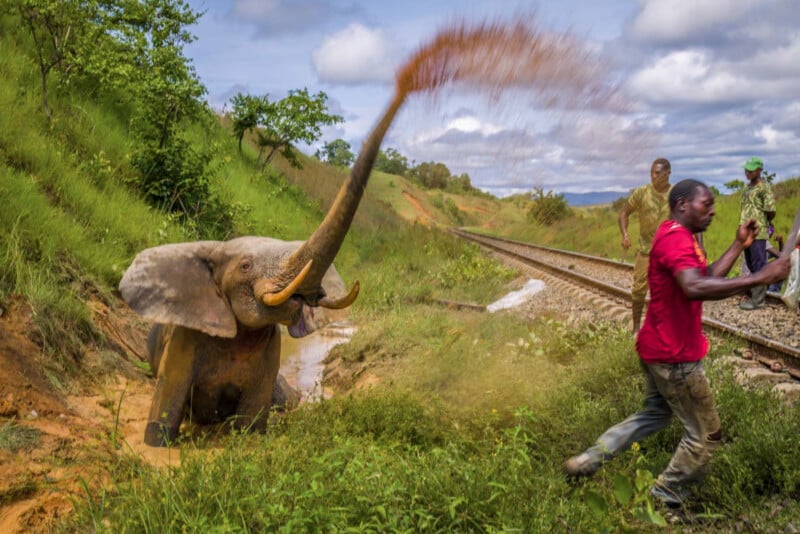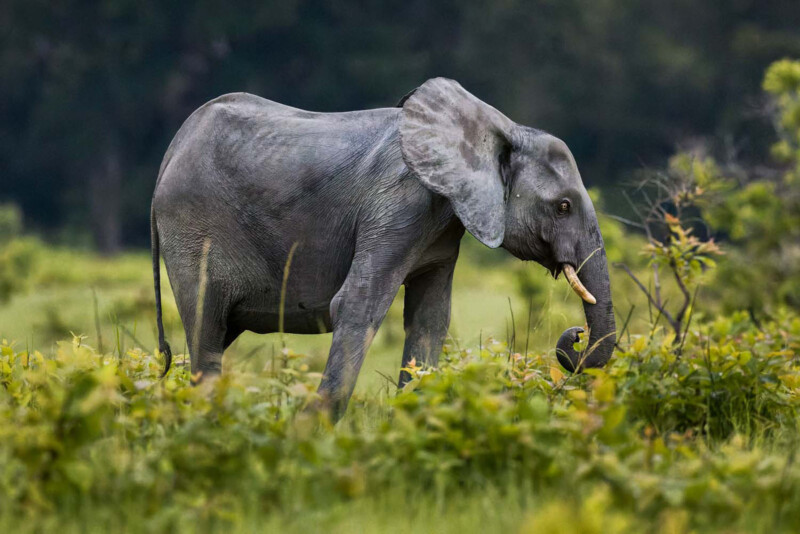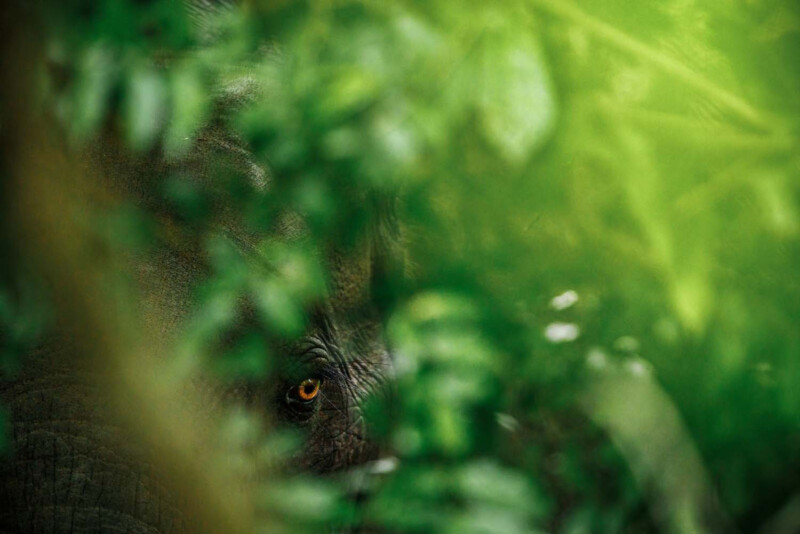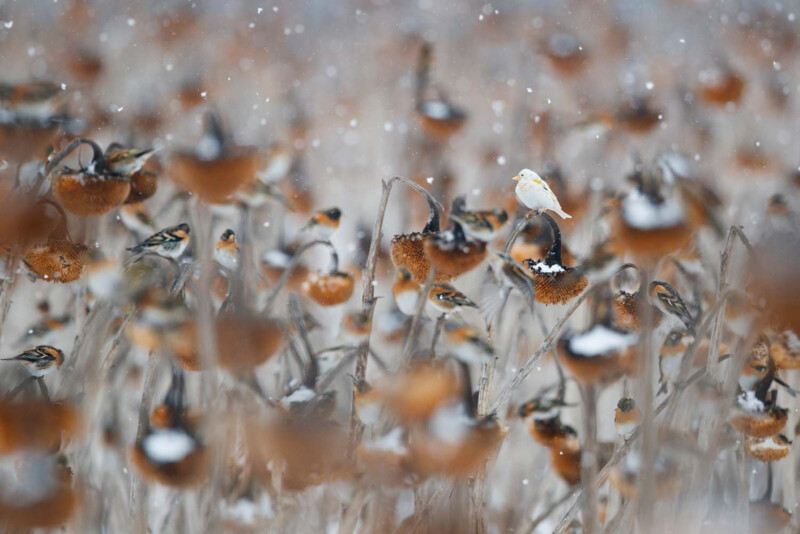Prize-Winning Photo Story Shows the Plight of Endangered Elephants

“After being shot a male elephant shows its frustration as it angrily sprays water at the crowd of bystanders after one of them had tried to cut off the elephants trunk.
During the night, the elephant was hit by a train transporting manganese between Moanda (in Gabon’s Haut-Ogooué province) and Gabon’s capital Libreville. The collision scattered the elephants right hip and a group of eco guards were called to the scene to do a full assessment of the incident. Since the elephant’s life couldn’t be saved, the park director decided it needed to be shot and that the meat would be distributed to the Lopé community. Unfortunately the shot didn’t kill the elephant and since there was only one bullet available the elephant is still fighting for its life.
After the shot was fired, the animal got really angry and started throwing a railway tie through the air and spraying water at the bystanders, after which the bystanders started to fight back and started throwing rocks at the injured animal. Meanwhile the community seems to have decided not to wait the passing of the animal, but to kill it using machetes.
Incidents with trains happen regularly in Lopé National Park (four more accidents happened during my remaining two weeks in Gabon) as the track runs through Lopé National Park and crosses many natural corridors. While the park director had his team do a full assessment of possible conflict areas along the track, the railway company has not done anything with this information. The railway company also refuses the trains to slow down as a result of economic pressure as the trains mainly transport manganese, which is Gabon’s second largest export product, accounting for roughly 11% of Gabon’s total exports.
Note: I was allowed to join but not allowed to photograph the shooting and the cutting.”
Dutch photographer Jasper Doest has won the prestigious Fritz Pölking Prize 2023 with a brilliant, gut-wrenching photo story about the endangered African forest elephants in central Gabon.
African forest elephants, the elusive cousin to the African savanna elephant, live in the dense rainforests of western and central Africa. Smaller than their savannah-based relatives, the African forest elephant is a critically endangered species.
Doest specializes in creating inspiring visual stories highlighting the relationship between humans and nature. With an educational background in ecology, Doest intimately understands his subjects and aims to use photography to instigate positive change concerning how people interact with and consider nature.

“On a gloomy day, well before sunrise, a forest elephant grazes on the open savanne together with her young. Looking at the female, she’s clearly in bad physical condition, with individual ribs clearly visible, depressions in front and back of the pelvic bone and a prominent backbone from tail to head, with deep depressions in the lumbar region.
After analyzing over 2500 photos from 1997-2018, scientists from the University of Stirling have detected long-term declines in forest elephant body condition at Lopé. As this data is correlated to the decline in fruit production in the forest, these declines in both plant reproduction and elephant body condition are indicative of system-wide change and are expected to have disproportionate impacts on the functioning and metabolism of the ecosystem.
As we realized the importance of this individual for our story, we tried to get closer, but soon after she fled into the forest.
After speaking with Robin Whytock, this elephant would probably rate body condition 1-2 on the scale of 1-10 that was used during the study, with one being lowest (Robbie: ‘basically dead’).”
Doest’s prize-winning story, A fragile refuge for forest elephants, shows the rainforest of Lopé National Park in Gabon. It is one of the world’s last safe havens for African forest elephants.
However, climate change is affecting the growth of fruit in the rainforest, and as a result, significantly reducing the food supply for the elephants and other large mammals; this change may have dire consequences for the entire ecosystem. Doest’s photo story also highlights that even when direct human contact with an ecosystem is limited, such as in the protected Lopé National Park, the impact of human behavior can still be felt.

“An African forest elephant in the dense rainforests of Lopé National Park. Their preference for dense forest habitat prohibits traditional counting methods such as visual identification, but recent research using DNA from dung samples has estimated 95.000 forest elephants to exists worldwide with Gabon being the stronghold for these large herbivores.
African forest elephants are smaller than African savanna elephants, the other African elephant species. Their ears are more oval-shaped and their tusks are straighter and point downward which allows them to move through the dense vegetation more easily. African forest elephants live in family groups of up to 20 individuals and forage on leaves, grasses, seeds, fruit, and tree bark. Since the diet of forest elephants is dominated by fruit, they play a crucial role in dispersing many tree species, particularly the seeds of large trees which tend to have high carbon content. They are therefore referred to as the ‘mega-gardener of the forest.'”
Additional images from Doest’s prize-winning photo story are available on the German Society for Nature Photography (GDT) website. Doest is a senior fellow of the International League of Conservation Photographers and an ambassador for the World Wildlife Fund. More of Doest’s work is available on his website.
Fritz Pölking Junior Prize 2023
Alongside Doest’s victory for the standard Fritz Pölking Prize, young photographer Mateusz Piesiak has won the Fritz Pölking Junior Prize 2023 for his photo series showing a waterlogged sunflower field that became a paradise for overwintering finches.

“A few years ago, a sunflower field close to my home could not be harvested because the soil was waterlogged after summer rains,” Piesiak explains. As summer waned, the seed-filled flowers attracted “countless” finches with a new food source.

Piesiak got his first camera at age 13 and has become a very passionate photographer. “When photographing timid birds, I actually enjoy the experience of sitting in my hide — I feel like a visitor in the front row of the theater, allowed to witness the great spectacle of nature at close range.”

GDT International Nature Photography Festival
Doest’s and Piesiak’s work will be displayed at this year’s GDT International Photography Festival on October 27, 2023. The festival will also feature the winners of the esteemed European Wildlife Photographer of the Year 2023 competition.
The Fritz Pölking Prize has been awarded 16 times since Pölking passed away in 2007. The German photographer and writer was extremely well-respected and a prolific artist and author. He was one of the founders of the German Society of Nature Photographers and had been named “Wildlife Photographer of the Year” during his career. He leaves behind a powerful legacy, more than 30 books, and a passion for nature photography that lives on through the prize named in his honor.
Image credits: Images courtesy of the German Society of Nature Photographers. Individual photographers are credited in the captions.